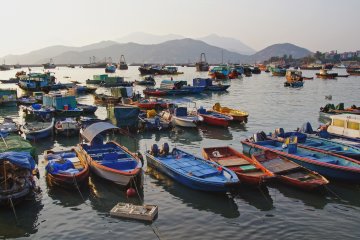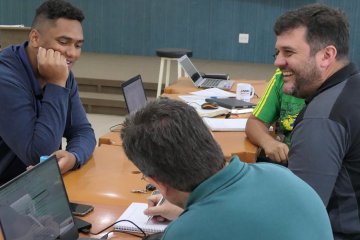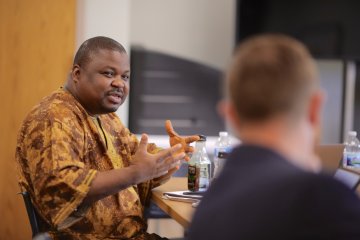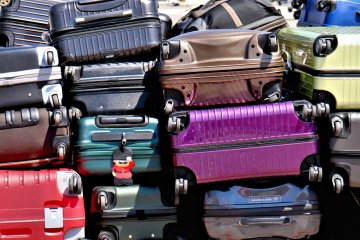A Beachhead for Gospel Advance: An Interview with Chris Bruno
Training Leaders International was founded with a vision to make theological education accessible to the global church. Over the years, that ministry has focused on underserved regions around the world. But our mission has recently led us to consider similar needs within the United States. Of all the reasons why pastors and church leaders struggle to access quality training, geographic and financial barriers are often the greatest. It’s no different in Hawaii. For this reason, and through a partnership with TLI and Bethlehem College & Seminary (BCS), Chris Bruno has a vision to establish a beachhead for theological training on the Hawaiian Islands, with the goal of strengthening churches and reaching the remotest parts of the Pacific with the gospel.
In this interview I talk with Chris, a professor of New Testament and Biblical Theology at BCS who previously served in pastoral ministry in Hawaii, about what makes this such a strategic opportunity.
When most of us on the mainland hear the word “Hawaii” we think of paradise. As someone who used to live there, tell us about the islands from the perspective of locals.
Let’s not pretend that there aren’t many appealing things about Hawaii. There’s a reason why people travel from all over the world to visit! The beaches, mountains, and constant rainbows display the glory of God in his creation like few other places on earth. But living there is very different from vacationing there.
For the locals, Hawaii can be a very challenging place. First, the cost of living is among the highest in the nation. The median price for a single family home on Oahu is $795,000. By comparison, in the Twin Cities where I currently live, the median price is $290,000. Honolulu, New York City, and San Francisco are consistently ranked as the cities with the highest cost of living in the US. However, while New York and San Francisco have many high paying jobs in tech and finance, many people in Hawaii work in retail or tourism and are forced to maintain multiple jobs to make ends meet. For most people, it’s anything but a permanent vacation!
Today, there are many churches on the islands. Can you explain some of the history of missions to Hawaii? Why do you still see it as a mission field today?
In the early 19th century, King Kamehameha united the major Hawaiian Islands for the first time into one kingdom. When he died in 1819, many of the long-established customs connected to the Hawaiian religious system were overturned. Shortly after this, the first Protestant missionaries arrived on the Islands. Within thirty years, the Kingdom of Hawaii was among the most Christian nations on earth.
Many of the ali’i (Hawaiian royalty) were faithful Christians, including the last Queen of Hawaii, Liliuokalani. However, in 1893 the queen was deposed by a group of American businessmen, some of whom were, shamefully, the descendents of the missionaries. In 1898, the US annexed the Republic of Hawaii. During the twentieth century, the territory (and later the state) of Hawaii went through a series of rapid changes. The post-war era led to the establishment of many churches through the International Mission Board, but mainline Congregational and Episcopal churches tended to drift away from the gospel. For decades now, the church in Hawaii has been in decline.
Because of the remoteness of the Islands and the lack of resources among most gospel-preaching churches, there are few options for solid, in-person theological training in Hawaii. But by providing those options, there’s a real opportunity for Hawaii to become a beachhead for theological training in the Pacific Islands, the Pacific Rim, and into Asia.
“Because of the remoteness of the Islands and the lack of resources among most gospel-preaching churches, there are few options for solid, in-person theological training in Hawaii.”
How does Hawaii’s remoteness present particular challenges for pastoral training and theological education?
In light of all the tumult in the world, pastors (and others) need to be equipped to come to the Scriptures to see the truth and find answers for all of the questions that many are asking. Right now, there are few if any on-the-ground options for this kind of training in the Islands.
In order to receive a robust theological education, students have two options: moving to the mainland to attend seminary or doing online education. The weakness of the first option is that it removes people from their local church context, and many young men who move to the mainland do not move back to the islands. The weakness of the second option is that online education is a fundamentally different delivery system that minimizes the essential discipleship aspects of theological training.
Other mainland seminaries have attempted to establish a presence, but these efforts now depend on reaching a critical mass of online students before considering starting an on-the-ground option. However, this approach makes it impossible to start a small, church-based, relationally-focused theological training program. The need for solid, in-person training remains.
While the COVID-19 pandemic has disrupted the whole world, it has affected Hawaii in unique ways. They’ve had some of the most restrictive measures in the world, and consequently have had some of the most severe economic effects. Regardless of whether the governor was right or wrong to enact these measures, the impact on the economy will be felt for years to come. This has caused many small businesses to fail and many churches to tighten their budgets. Even under normal circumstances, Hawaii is a difficult place to live and do ministry. Now perhaps more than ever, faithful churches there are stretched thin and in need of encouragement and equipping.
In a sense, your ministry could be described as serving the “uttermost parts” of the earth. What is your dream for Hawaii and the greater Pacific Islands?
Hawaii is sometimes called “the crossroads of the Pacific,” which is why it has long been valued as a strategic military location. Many people in Hawaii were born in other places, and many more are only a generation or two removed from Japan, Korea, China, the Philippines, Vietnam, the Marshall Islands, or Samoa. In other words, Hawaii is both geographically and culturally closer to many of these places than the mainland is. To lean into this situation, we hope to provide multiple training options in the Pacific Islands.
On a recent visit to Oahu, I had a conversation with a Samoan pastor who was lamenting the lack of places for young men to be trained for ministry, both in Hawaii and in Samoa. We want to help meet that need and partner with Samoan, Marshallese, Chuukese, Filipino, Korean, Chinese, and other nationalities from across the Pacific so they can be trained and sent. We pray that Hawaii would become a beachhead for solid theological training and a sending base for the rest of the Pacific Islands and Pacific Rim.
But to send people to those places, we have to send them well equipped. Ideally, they’d be able to get training without moving to the mainland and without having to do courses online. So we want to see preaching workshops multiplying across the Pacific as more pastors sharpen each other and commit to biblical preaching. We’re also praying there’d be a faithful core of teachers being trained through a local extension of BCS with in-person, theologically robust training in an evening degree format on Oahu, the Big Island, and Maui.
In short, we want to establish both formal and non-formal theological training and equipping options for pastors and churches in Hawaii and across the Pacific Rim so we can send people from these regions all over the world.
To learn more, visit chrisbruno.net.
Elliot Clark (MDiv, The Southern Baptist Theological Seminary) served in Central Asia as a cross-cultural church planter along with his wife and children. Since 2016, he has worked with TLI equipping indigenous church leaders overseas and diaspora pastors within the U.S. He is the author of Evangelism as Exiles and Mission Affirmed.



